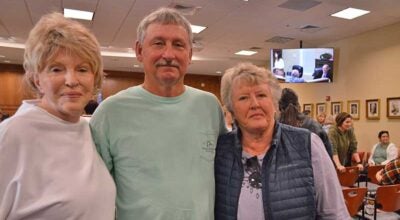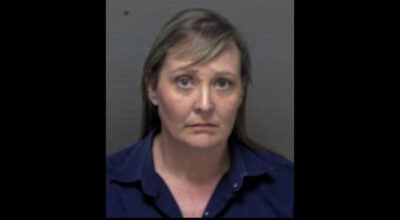Court tosses convictions of former Wilmington Trust execs
Published 1:31 pm Thursday, January 14, 2021
|
Getting your Trinity Audio player ready...
|
By Randall Chase, Associated Press
A federal appeals court has overturned the convictions of four former executives for the only financial institution to be criminally charged in connection with the federal bank bailout program.
A three-judge panel on Tuesday reversed the convictions of the former Wilmington Trust executives for making false statements to federal regulators and ordered that acquittals be entered. The court also ordered a retrial of conspiracy and securities fraud charges.
The ruling marks a stunning reversal in the government’s case against former Wilmington Trust president Robert Harra Jr., former chief financial officer David Gibson, former chief credit officer William North and former controller Kevyn Rakowski. They were convicted in 2018 of fraud, conspiracy and making false statements. The bank itself was also criminally charged but reached a $60 million settlement with prosecutors just as a trial was set to start.
Harra and Gibson were sentenced to six years in prison. North received 4½ years and Rakowski was sentenced to three years. All four remained free on bail pending appeal.
“My client and our team are obviously very happy, and incredibly relieved, that the Third Circuit panel unanimously agreed that these convictions were wholly unfair and unjust,” said Michael Kelly, Harra’s lead trial attorney.
“In my view, this case was an incredible waste of taxpayer dollars that literally ruined the lives of four innocent people,” Kelly added.
U.S. Attorney David Weiss said his office is evaluating its options, including retrying the defendants for conspiracy and securities fraud.
“In a matter of first impression, the court held that the government was required to establish that the defendants’ statements were false under any ‘objectively reasonable’ interpretation of the applicable reporting instructions — even in a circumstance where a defendant never believed in that interpretation and intended to lie to the regulators all along,” Weiss said in a statement.
Prosecutors alleged that in the wake of the 2008 financial crisis, the executives misled regulators and investors about Wilmington Trust’s massive amount of past-due commercial real estate loans before the bank was hastily sold in 2011 while bordering on collapse. Founded by members of the DuPont family in 1903, the bank imploded despite receiving $330 million from the Troubled Asset Relief Program.
Prosecutors said bank officials “waived” millions of dollars in matured loans from reporting requirements if they were designated as “current for interest” and in the process of being extended. To ensure that loans well past their repayment dates were purportedly exempt from reporting requirements, the bank lent even more money to struggling developers just to make the interest payments.
In the fourth quarter of 2009, bank officials reported only $10.8 million in commercial loans as 90 days or more past due, concealing more than $316 million in past-due loans subject to the waiver practice, prosecutors said. After a meeting to discuss matured loans and “how to make them go away” by year’s end, bank officials went beyond the waiver practice and decided on a “mass extension” that involved temporarily extending more than 800 commercial loans worth $1.3 billion, prosecutors said. In an email to Harra, North referred to certain loans as “credit turds.”
Meanwhile, before its 2011 fire sale to M&T Bank, Wilmington Trust raised $287 million in a 2010 stock offering, intended partly to help repay the TARP funds, while hiding the truth about its shaky financial condition from investors, prosecutors said.
Defense attorneys argued that the waiver practice had been in place for decades and was no secret. They also maintained that instructions for filing reports with the Federal Reserve and for disclosing financial information in Securities Exchange Commission filings were ambiguous, and that the term “past due” was not clearly defined.
The appeals court agreed that the reporting requirements were ambiguous, while noting that the case involved a question of first impression regarding the burden of proof to establish falsity in the face of ambiguous reporting requirements. To prove falsity beyond a reasonable doubt, prosecutors needed to demonstrate either that their interpretation of the reporting requirement was the only objectively reasonable one, or that the defendants’ statements were also false under each alternative, objectively reasonable interpretation, the panel said.
The panel also said the question of reasonableness is an issue for the jury, not the judge. The trial judge had ruled that the reporting requirements were not ambiguous and that defense arguments to the contrary were not reasonable.
The panel said that while prosecutors had presented sufficient evidence regarding conspiracy and securities fraud based on the mass-extension scheme, the convictions were tainted by their companion theory of liability based on the waiver practice. The panel ordered a retrial on those charges limited to the mass-extension theory of fraud.
Wilmington Trust’s settlement with prosecutors included a civil forfeiture of $44 million and $16 million it previously paid to the SEC in a related lawsuit.
In a separate civil action, Wilmington Trust agreed to pay $200 million cash to settle a shareholder lawsuit alleging fraudulent concealment of billions of dollars in bad loans. Auditing firm KPMG agreed to pay an additional $10 million as part of the settlement.
RECENT HEADLINES:
One dead, several hurt after retaining wall collapses in North Carolina






